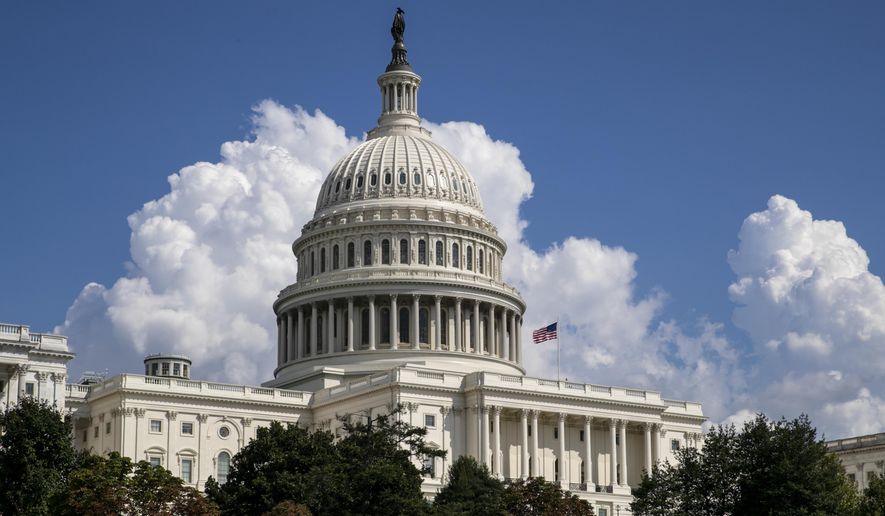Lawmakers on Capitol Hill demanded hearings into fraud in the government’s coronavirus unemployment benefit program after hearing that crime syndicates in China, Russia and other adversary nations pocketed tens of billions of dollars.
Both Republicans and Democrats demanded accountability for mismanagement of funds, which The Washington Times reported this week. Of more than $700 billion in pandemic unemployment assistance Congress approved, as much as $175 billion fell into the hands of foreign fraudsters, and most of that went to syndicates that have the backing of other governments.
Rep. James Comer, the ranking Republican on the House Oversight and Reform Committee, called the numbers “deeply troubling” and said it deserves his panel’s “immediate attention.”
“For nearly a year, I’ve sounded the alarm about massive fraud in pandemic unemployment benefits but Oversight Committee Democrats have refused to hold a single hearing on this gross mismanagement of taxpayer dollars,” the Kentucky Republican said Tuesday.
Republicans also said the revelations should be a warning as Democrats push for a roughly $1.75 trillion budget bill that would dramatically expand social service spending.
“Dems are pushing a bunch of new govt programs in their Build Back Bolshevik plan when we can’t even run existing ones without funneling $$$ to scammers and tyrannical regimes,” Rep. Chip Roy, Texas Republican, tweeted Tuesday.
The Times report cited estimates by Haywood Talcove, CEO of LexisNexis Risk Solutions’ government division, who estimates that about 40% of the unemployment money Congress approved ended up going to fraudsters.
Some of that went to domestic schemes, but more — $175 billion, by his estimate — went to overseas scammers. And of that, $140 billion went to state-backed operators.
“There’s an international fraud scheme trying to steal money for nefarious purposes,” Mr. Talcove said.
Sen. Benjamin L. Cardin, Maryland Democrat, said that the pandemic forced Congress to weigh tradeoffs between distributing funds quickly and ensuring safeguards were in place to combat fraud, but they ultimately missed the mark.
“I think it was well-intended to get relief out as quickly as possible to save lives,” he told The Times. “And we recognize that too much of the accountability standards can slow down the process.”
“Clearly, we’ve got to get that balance right,” he said. “And to the extent where we see these international crooks ripping us off, we didn’t get the balance correct.”
But, Rep. Madison Cawthorn, North Carolina Republican, took a tougher line. He said the revelations that pandemic relief funds found their way into the hands of Chinese-backed crime rings are especially shocking and cannot be overlooked.
“If federal funds designated for COVID relief went to any entity in China, they should pay it back immediately as a down payment for reparations they owe the United States and the world for unleashing a global pandemic,” he said.
Sen. Marsha Blackburn, Tennessee Republican, said: “I hope these reports make it obvious that our adversaries abroad will not hesitate to exploit even the most well-intentioned programs.
“Russia, China and other elements of the new ‘axis of evil’ thrive on the chaos created by these acts of brazen theft, and we must take steps now to stop the bleed of taxpayer dollars to foreign actors, recover what was stolen, and study remaining vulnerabilities to ensure funds dedicated to other programs don’t meet the same fate,” she said.
Large-scale fraud rings generally used long lists of names scoured from the internet and filed unemployment claims in their names using pilfered personal identifying information that can be bought off the dark web for a couple of bucks a name.
Some fraudsters even shared their tactics online, creating playbooks for others to follow.
Companies have long dealt with these kinds of scams and have filters in place to weed them out, but state unemployment agencies were largely defenseless. Mr. Talcove said that’s chiefly because fraudsters hadn’t bothered with them before.
But when Congress poured hundreds of billions of dollars into the state programs to try to prop up the economy and prevent catastrophic outcomes for the jobless, the program suddenly became a target. The average pandemic unemployment payout totaled $26,000.
Fraud also struck other pandemic programs, including assistance to companies to maintain their payrolls amid the unprecedented economic slump in the spring of 2020.
Sen. Richard J. Durbin, Illinois Democrat, said that deserves attention.
For more information, visit The Washington Times COVID-19 resource page.
• Joseph Clark can be reached at jclark@washingtontimes.com.
• Kerry Picket can be reached at kpicket@washingtontimes.com.




Please read our comment policy before commenting.